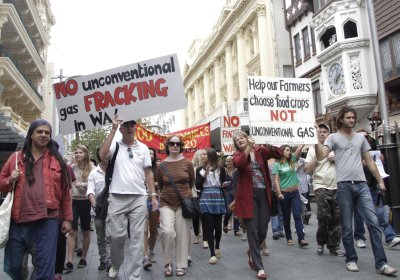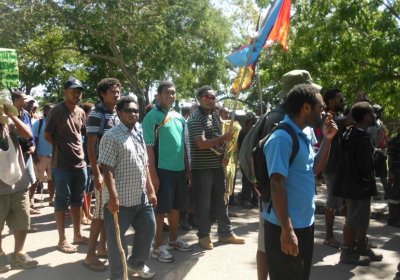Argentine President Cristina Kirchner announced the nationalisation of Federal Petroleum Deposits (YPF), the country's largest oil extractor and refiner, on April 16.
Altogether, 51% of Spanish oil multinational Repsol's 57% stake in YPF has been claimed by the Argentine government.
The move shook the markets, with YPF shares falling 30% on the New York stock exchange.
The nationalisation has drawn condemnation from Spain, the European Union and the United States ― as well as US regional allies Chile, Colombia and Mexico. In contrast, it was applauded by Venezuela and Bolivia.
919
The Darwin Asylum Seeker Support and Advocacy Network released the statement below on April 24.
* * *
A 10-year-old year old Vietnamese asylum seeker has provided a community visitor from the Darwin Asylum Seeker Support and Advocacy Network (DASSAN) with a letter pleading for help.
The 10-year-old girl arrived in Australia by boat in March 2011 and has been detained in three different centres located in three different states since arriving in Australia.
Environmentalists seem to realise that they have some stake in a fight such as the Ecuador-Chevron lawsuit.
That case, which Chevron has recently moved to an international arbitration panel to try to avoid a multibillion-dollar penalty handed down by Ecuadorian courts, is about whether a multinational oil corporation will have to pay damages for pollution, for which it is responsible. Most environmentalists figure that would be a good thing.
Stand Fast, an anti-war group of military veterans, released the statement below on April 24.
* * *
“You do not honor the dead through mindless flag waving, rewriting history or promoting new wars,” said Hamish Chitts, East Timor veteran and spokesperson for Stand Fast — a group of veterans and former military personnel who oppose the wars in Iraq and Afghanistan.
No Fracking WAy held its first rally against fracking and unconventional gas extraction in the state on April 21. The demand was for a moratorium on unconventional gas until it could be proven safe for human health and the environment.
The crisis embroiling the government of Papua New Guinea has taken new turns as sections of the establishment struggle for power. Public outrage has grown against new laws that undermine the country's constitution.
Just days after pledging it would not use the new powers of the Judicial Conduct Act to suspend judges, the government of Prime Minister Peter O'Neill suspended Chief Justice Sir Salamo Injia and Justice Nicholas Kirriwom on April 4.
“April 13, the great day of victory 10 years ago, opened the way to the independence and unity of our Latin America and the Caribbean,” Venezuela's socialist President Hugo Chavez said on April 13. He was speaking during a commemoration of the uprising that toppled a short-lived military coup that aimed to crush the Chavez presidency .
“We showed that a people united will never be defeated.”
A series of protests, or Hikoi, will take place across New Zealand from April 24 to May 10, under the banner “Aotearoa Not For Sale”.
The demonstrations are being organised against the pro-privatisation, pro-mining and anti-social agenda of the National Party government, led by Prime Minister John Key.
The Hikoi will kick off at the top of New Zealand's north island at Cape Reinga on April 24.
Mental health workers have been striking for two hours at a time in rolling stoppages around Victoria since April 10. The campaign is in support of a new enterprise bargaining agreement.
Key elements of the claim include a 16% pay rise over three years and improved staffing.
After seven months of negotiation, the government has still not budged on its position of capping pay rises at a below-inflation 2.5% a year.
The union covering mental health workers, the Health and Community Service Union (HACSU), has negotiated with the employers via Fair Work Australia.
The Community and Public Sector Union (CPSU) was forced into compulsory arbitration in December over the primary Victorian Public Service Agreement (VPS), but continues to campaign on several other agreements.
There is still no outcome of the compulsory arbitration from the VPS, which covers 30,000 state public servants.
For agencies such as the Victorian SES, parliament and parks, enterprise bargaining agreements expired mid-last year. But negotiations were stalled because the government still insists on a cap of 2.5% a year on public sector pay rises.
Another week, another atrocity committed by occupying forces in Afghanistan kindly captured on camera by the perpetrators.
Isn't technology fantastic? Back in the bad old days of the Vietnam War, intrepid war reporters had to risk their lives in the middle of war zones to get images of terrible crimes committed by the occupying force. Now, with these wonderful smart phones and cheap, easy to use digital cameras, the bastards can do it themselves.
A Labor MP, escort services, huge salary packages, allegations of nepotism and police probes have all been connected to the ongoing Health Services Union (HSU) scandal.
The scandal involves allegations against top HSU officials, who are claimed to have misused union funds paid by union members such as ambulance drivers, nurses and health support workers.
- Previous page
- Page 2
- Next page







